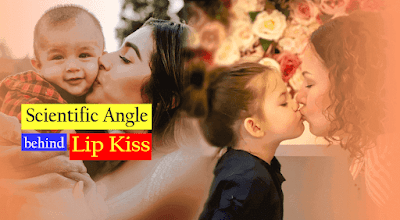A kiss is the touch or pressing of one's lips against another person
or an object. It can express sentiments of love, passion, romance, and
good luck, among many others. But have you ever wondered why humans
kiss? Did you know there is a whole science behind a lip kiss? Kissing
is wonderful, so much that you can mostly recall your first ever kiss.
Although, it is nothing more than two people coming close to each other
and exchanging their saliva. You end up exchanging 80 million bacteria
when you kiss your beloved. It may sound gross, but it is actually good
for you and your health.
Our first experience of love is related to lips. The way a child uses his lips while drinking milk from mother’s milk or bottle is very similar to kissing. These initial things only prepare the path related to the neural / nerves in the child’s brain, which creates a positive feeling in the mind about kissing.
So, what’s the science behind a lip kiss?
Kiss
surely seems like a natural thing, 90 percent of cultures kiss which
makes it a basic human instinct. The kissing came from the practice of
kiss-feeding, wherein a mother used to feed their new-born
mouth-to-mouth. Kissing stimulates your salivary glands, which increases
saliva production. Saliva lubricates your mouth, aids in swallowing,
and helps keep food debris from sticking to your teeth, which can help
prevent tooth decay and cavities
What’s the purpose of kissing?
According
to science, when we kiss, we are looking for a mate who matches our
genetic make-up. Another report says that we have a group of genes
called the MHC (major histocompatibility complex) genes that form part
of our immune system and give us our natural scent.
What happens to our brains when we kiss?
Our brain releases a chemical cocktail that makes one feel good and it also ignites the pleasure centers of the brain. Thinking about what chemicals? As per Healthline, chemicals including oxytocin, dopamine, and serotonin, which can make you feel euphoric and encourage feelings of affection and bonding. It also lowers your cortisol (stress hormone) levels.




0 Comments